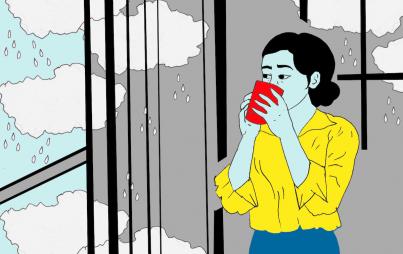
Let's talk about trigger warnings.
Perhaps the trigger warning is tantamount to saying, “DON'T LOOK OVER THERE. That guy’s brains are on the sidewalk.” It appeals to our natural sense of curiosity. DON’T LOOK NOW, but there is something awful here that you definitely don’t want to read (but most likely will, anyway).
Seven years ago, I would start at least one day of the week by running to IHOP. IHOP is not at all close to my house. But I really like pancakes, so to afford myself the caloric intake of two pancakes with a tiny smear of butter and a tablespoon of syrup, I would run.
Many miles. For two pancakes.
Pancakes are a trigger for me — but only IHOP pancakes. Also In-Shape fitness, the gym I went to every day. My bike. Lululemon running shorts. Scales. Mirrors. Tape measures.
The trigger-worthy experiences started well before the pancakes. When I was 9, I was physically and verbally abused by my stepfather, and in the years prior, by other stepfathers/boyfriends/friends of my mother, and my mother herself. When I was 13, I was sexually abused by my best friend’s brother. When I was 20, I lost my first daughter during pregnancy. I’m divorced. I’m the child of an addict. I’m the child of a mentally ill person. I had an eating disorder I didn’t even know was an eating disorder. I have body dysmorphia, anxiety, depression, OCD, Bipolar Disorde — the DSM-IV is essentially an anthology of my life.
My triggers include (but are certainly not limited to): sexual abuse, physical abuse, infant/child loss, bipolar disorder, anxiety, depression, OCD, addiction, eating disorders, pancakes, gyms (but only In-Shape), bikes, running shorts, scales, mirrors, tape measures, and asparagus (because my mother made me eat it for three meals, until I vomited).
I write and edit for Ravishly, so trigger warnings, and the folks triggered, are part of my job — and not a small part. I try to approach both my writing and editing thoughtfully. I often find myself questioning if something might be triggering to our readers and, if so, should I warn them? And if I warn them, what am I saying about the trigger and their recovery? What is the underlying message of the warning? How does the warning benefit or harm those to whom it might apply?
The origin and implementation of the trigger warning is new-ish, showing up on the tumblr scene regularly around 2007. Born out of feminist blogging, the trigger warning was ostensibly put into practice to protect those who may find a specific topic to be “triggering” — most commonly sexual/physical abuse and/or eating disorders. I deeply respect the people whose experiences may warrant a trigger warning (including myself), and yet, I question the effectiveness of the practice.
Trigger warnings are usually ignored. I’m a super-scientific researcher, so I asked my Facebook and Twitter friends how many of them actually heed a trigger warning. As it turns out, the answer is not very many — those that do usually do so for rape/sexual abuse or child abuse/death. Obviously this isn’t a cross-section of society — I don’t know that many people. But it’s data just the same; enough to hypothesize that most people ignore the warning, even if the topic is triggering for them. Why? Perhaps the trigger warning is tantamount to saying, “DON'T LOOK OVER THERE. That guy’s brains are on the sidewalk.” It appeals to our natural sense of curiosity. DON’T LOOK NOW, but there is something awful here that you definitely don’t want to read (but most likely will, anyway).
Trigger warnings can limit discourse. If we are constantly triggered, or writers imply such, if we can’t go into unfamiliar — or too familiar — territory, how can we discuss it? How can we glean the wisdom others have to offer? Can we offer, and feel, solidarity?
Trigger warnings may not give us the credit we deserve. Many women just aren’t in an emotional space to stare down these deeply painful experiences. But some of us are. Talking about mental health or my disordered eating isn’t easy or comfortable for me. But I do it. I do it, because to own it is to help me heal and to hopefully help others heal as well. I ran for a fucking pancake.
Trigger warnings don’t exist in temporal life. There is no trigger warning at the grocery store line for the cover of Vogue or Star. Your neighbor isn’t like to offer a trigger warning when she starts talking about her diet, which may include any or all of the disordered eating behaviors you have engaged in yourself. IHOP has no trigger warning, and I have to drive by it quite often, regardless of the feelings that may produce. Life is far more triggering than anything I would or could ever read. There is no trigger warning for the pert ass in front of me at yoga. She just conjures up images of my formerly tiny ass. The end.
Trigger warnings aren’t a science, and they may even hinder recovery. Does every trauma survivor need a warning? Does the presence of a warning presume PTSD where there may be none? Does it demean those who have recovered from PTSD? And what about avoidance? PTSD sufferers are admonished to confront their trauma. The trigger warning may actually prevent them from doing so.
Trigger warnings victimize. The presence of a trigger warning, for victims in particular, can minimize their healing and survival. If you have come out the other side or rape or bulimia, and you’ve recovered, what does a trigger warning imply? That you are still triggered and have not yet recovered? And what does that say about your recovery — is it diminished; minimized? Can you still call yourself recovered if someone is constantly reminding you that you should be triggered? This is armchair psychology at best, and destructive at worst.
Trigger warnings are probably used to increase site traffic. Granted, this isn’t a reason to not offer them, but I suspect — again, super-scientific research — that offering a trigger warning only encourages people to click (very popular trigger warnings are also the very popular terms for search engines). See: brains, sidewalk. With that in mind, can we conclude that many sites may use the TW tag to their benefit? I’m gonna say yes.
Is the trigger warning you? Are you the trigger warning? Have the two become intertwined? Are we benefiting from the trigger warning practice? What do you think?







